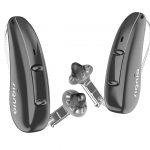Some things to consider….
For those with insurance which offers a hearing aid benefit including many Medicare Advantage plans!
The most important thing for you to consider is this: the person you’re seeing an Audiologist, preferably a Doctor of Audiology. If you go to see a Hearing Aid salesperson (sometimes advertising themself as a Hearing Aid Specialist), you may wind up getting hearing aids, but your insurance company won’t pay!
An Audiologist is someone who has completed at least a college-level master’s degree. Further, for the past several years, the requirement for those seeking to become an Audiologist has been a Doctor of Audiology degree. State licensing for a Hearing Aid salesperson, on the other hand, is generally a requirement of a high school diploma and passing a state-sponsored test after a few months to a year of on-the-job training.
An Audiologist provides medical evaluation in areas such as balance, tinnitus, and more not relying solely on selling hearing aids for their income while a Hearing Aid salesperson is limited to simply selling hearing aids.
Insurance. Think about this next…
We recommend that as you’re choosing an Audiologist for your hearing care, you determine if your insurance has a hearing care (testing) benefit AND, as a lot now do, a hearing aid benefit. From there, you’ll want to know if the Audiologist PARTICIPATES directly with YOUR insurance company and their HEARING NETWORK!
It’s not enough for a provider to say, for example, “We participate with all major insurances.” Your insurance benefit, especially for hearing aids, is almost always through a totally separate (and usually independent) company (often with a totally different name from your insurance) and the Audiologist must be contracted with THEM!
In our area, very few do this because this deprives them of their ability to set their own prices on what they sell. Since the advent of these hearing networks, we’ve participated in nearly all of them because we feel that the more people who can live better lives through better hearing, the better their world will be. Sounds a bit corny we’ll admit, but it’s true – honestly!
Don’t be fooled by a run-around (“We’ll fill out all the forms….” or whatever) because that won’t assure that you’re getting the negotiated price your insurance company has agreed on with the manufacturers. Good news: most insurance companies have a very broad selection of major hearing aid manufacturers from which to select.
And a little more…
Here’s the (very small) catch: YOU will need to make a call to your insurance company’s HEARING HEALTHCARE NETWORK to sign up for your benefits under their plan. There is no cost or obligation just to sign up. This will be a separate company from your insurance company. They’ll ask you your insurance policy information etc. and generally they prefer to make the appointment arrangements with the Audiologist. Sometimes finding who to call can be a bit difficult (it’s a benefit, after all, and if you don’t use it, they save money!) but give us a call and we’ll point you in the right direction to get started.
Once you’re signed up with your insurance carrier’s hearing network, you’ll have an appointment set up and you can come in to see us. Bring along a spouse or friend if you’d like. Most of the time, this is very helpful, particularly as they’ll remember things that you may not (or may not hear correctly).
We normally plan an hour for the initial appointment time by first-time patients. This will allow enough time for the Audiologist to give you an audiological examination (don’t worry: it’s quite painless!) and then talk about the results. IF (and only IF) you would benefit from a hearing aid (or two), he’ll also provide his recommendations. We’ll also talk with you about how much you’ll be expected to pay to your insurance company’s hearing network – and nearly all insurance benefit programs want your portion of the payment (if there is any) before they will order the hearing aids.
Just so you know, if you’re covered by a hearing aid benefit plan, we can’t give you prices until after you’ve had your hearing exam because until we know your hearing loss level, we don’t know if you’ll be better served by one aid or two and by what level of technology – which also considers your budget. AND IT DEPENDS ON WHAT YOUR INSURANCE COVERAGE OFFERS in terms of hearing aid brands and THEIR prices!
It’s a bit complicated – but we’ll be right here to help!
Insurance ‘stuff’ can seem complicated: it’s something you don’t do every day. The playing field changes very, very regularly. Insurance carriers may switch to a different network, for example, so the benefits you had two years ago might be entirely different now. We’re happy to talk you through these things and answer any questions you may have. We ‘do’ insurance daily and we’ve learned how to make things as simple as possible for you.
Even if you choose not to see us (or perhaps you’re reading this from beyond the Downeast Maine area, BE SURE that the Audiologist you see is part of the Hearing Healthcare Network for your insurer!


